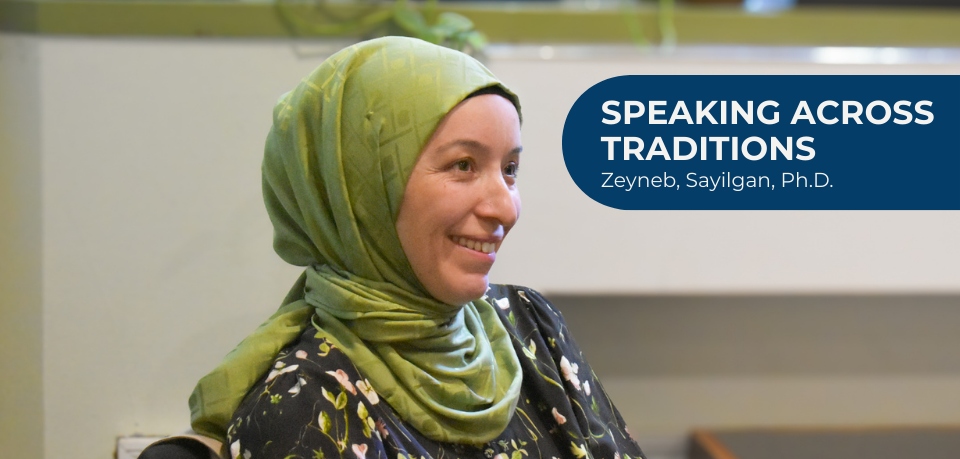
What can Islam say to Christianity today? For ICJS Muslim Scholar Zeyneb Sayilgan, Ph.D., this question is not just academic—it’s personal, pastoral, and deeply interreligious.
Over the past year, she has shared Islamic perspectives with Christian readers through essays in U.S. Catholic, The Guardian and The Living Church. Her work explores how Muslim tradition speaks to universal human experiences like grief and loneliness and shared religious practices like pilgrimage, and devotion to Mary—while offering fresh resources for Christians seeking common ground.
In U.S. Catholic, Sayilgan’s essay on “What Catholics can learn from Islam about the pursuit of happiness” (May 2025) drew on Islamic teachings to address the loneliness epidemic and the search for meaning.
“The problems I write about—whether grief or loneliness—are human problems,” she explains. “I offer a Muslim response, but I want readers to see how we can respond together.”
That dialogical spirit also animates her article in The Guardian newspaper: “I grew up Muslim in a Catholic community—and Mary represented common ground” (December 2024). Reflecting on her upbringing in Germany, Sayilgan shows how Mary (Maryam, as she is known in Islam) became a bridge between Christian and Muslim devotion. That theme continued in her ICJS minicourse Maryam, the Muslim Mary: An interreligious figure who unites and divides us (September 2024) and now anchors a forthcoming book project.
Sayilgan’s choice to write for Christian audiences is intentional.
“There are not many Muslim scholars writing for Christian publications,” she notes. “I want to connect, to build bridges, to amplify religious voices in the public sphere.”
Her essays often blend personal narrative, scriptural insight, and a call to action. In her U.S. Catholic article “What Catholics can learn from Muhammad about grief “(October 2024), she drew on Muhammad’s experience of grief, as well as the tragic death of her own daughter, to offer comfort across faith lines. In another U.S. Catholic essay, (August 2024), she highlighted three Qur’anic concepts to guide interfaith dialogue, reminding readers that the Qur’an itself models a relational approach to truth. And in The Living Church (June 2024), she described the Hajj as a vision for interreligious life—where diverse communities walk together and discover unity in difference.
This approach reflects a pedagogy Sayilgan honed teaching non-Muslim students at Catholic University, Virginia Theological Seminary, and Georgetown.
“As I explain Islam to others,” she recalls, “I also learn more about my own faith.”
For Sayilgan, hope is always at the center. “I don’t want to just state a problem,” she says. “I want to offer hope and an action piece. Even something simple—like inviting your neighbor for coffee—can build bridges.”
Through her scholarship, teaching, and writing, Zeyneb Sayilgan is doing just that: helping Muslims and Christians hear one another anew, and showing how friendship across traditions can overcome fear.
8/21/25